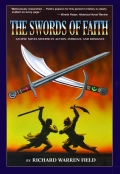Books-Into-Movies: “Water for Elephants” (based on the book WATER FOR ELEPHANTS) September 15, 2012
Posted by rwf1954 in book synopsis, books, books compared to movies, books into movies, movie commentary, movies, movies based on books, Sara Gruen, Water for Elephants.Tags: book commentary, book synopsis, books compared to movies, books into movies, movie commentary, movies, movies based on books, Sara Gruen, Water for Elephants
trackback
(Richard Warren Field wrote the award-winning novel,
The Swords of Faith. Read why this book will make a great movie.)
Water for Elephants is what I would call a small story, a slice-of-life of an elderly man, without huge historical ramifications. But the novel is well-crafted with a story that draws readers in, then moves briskly ahead, with characters and conflicts making readers anxious to know how each dramatic question will be answered. The novel became popular with readers, making it a logical choice for movie adaptation to tap that ready-made audience. But the filmmakers made a number of changes, dictated by the differences between the story-telling mediums. I will point out three big differences first, changes that created the need for other changes. I will then comment on other notes of comparison as I found them to be of interest:
First, the story-within-the-story nature of the book is set up completely differently in the movie. In the book, Jacob is in the rest home when the residents hear about the circus coming to town. Jacob, 90 or 93 by his aging recollection, hears a resident say he carried “water for elephants.” Jacob becomes agitated and belligerent—the man could not have carried “water for elephants” because elephants drink so much water. Jacob then reflects on his life with the circus, flashing back to the story-within-the-story. The “water for elephants” phrase in the movie is mentioned in passing by the August character, before the elephant arrives. The title of the book makes sense as the phrase that triggers Jacob’s reflection back. The title of the movie seems barely connected at all to the story as adapted. And, the story-within-the-story in the movie comes with elderly Jacob telling his story to the leader of the modern circus. This scene that begins the movie, comes at the end of the book.
Second, Jacob and Marlena begin a dangerous flirtation much earlier in the movie. In the book, Marlena stays distant from Jacob for much of the early part of the story, to the extent that Jacob does not know if she returns his feelings for much further along in the story. This appears to be a necessary shift because of the nature of the story-telling mediums. Novels allow character interiors to be displayed easily, so subtlety of emotion and mood can be offered to the readers/audience with the story still moving ahead. In Water for Elephants, we have Jacob’s first person interior to drive events. In movies, the audience is limited to viewing the story through a third-person omniscient view. Voice-over monologues can address this issue, but too much of it in a film becomes irksome. So to drive the story, and bring the film’s two main stars together, sparks fly between them earlier.
Third, the character of “Uncle Al,” the unscrupulous, evil circus owner is rolled into August in the movie. This was clearly done to streamline the plot. Movies are shorter story-telling forms than novels, and filmmakers are often faced with this issue of what to cut to streamline a story. The choice does make the story more efficient, but removes a rich nuance from the story. In the novel, the troubled August, a charming man prone to paranoid rages, also has to deal with a superior who is easily even more unprincipled and brutal than he is.
Chronologically, here are some other observations of comparison:
- The Prologue in the book is the depiction of Jacob becoming aware of the developing stampede. In the movie, this scene is saved for its actual chronological positioning in the story-within-the-story.
- Elderly Jacob’s complaints about the rest home (what I think we now call an assisted living facility) are from the book, as is his 71-year-old son’s forgetting their planned outing to the local circus.
- The set-up that brings Jacob to the circus, including his veterinary training at Cornell, and his parents’ tragic double-fatal accident, and the bankruptcy of his parents’ estate, is straight from the book.
- Camel, the old man who ends up paralyzed from drinking poisonous liquor, takes on a bigger role in the movie. Camel does initially greet Jacob when he jumps the train in the book, but then brings him to August. In the book, it is August who befriends Jacob and orients him to his new life, acting as a buffer between Jacob and the malevolent circus owner “Uncle Al.” Because “Uncle Al” and August are rolled into one character in the movie, Camel’s character steps up to serve that role. In the book, this allows us to see a softer, more charming side to August, making his eruptions into brutality even more troubling, for Jacob, and for readers. Camel does become afflicted with the creeping paralysis in the book, a tragedy the author tells us in her “Author’s Note” that struck “approximately one hundred thousand Americans” during that time period.
- Jacob’s handling of the injured leg of the star horse is basically from the book, including August feeding the euthanized horse to “the cats.” (So is August’s statement, when they are feeding spoiled meat to “the cats,” that they are out of goats.) In the book, we have the added layer of “Uncle Al.” Jacob’s job is in jeopardy after the action, but August is not the one who will be responsible for ending Jacobs services. “Uncle Al” is convinced to keep Jacob on. After all, he has veterinary skills, demonstrated ably with his initial diagnosis of the horse’s ailment.
- In the book, August also gets Jacob to put his arm into the cage of the toothless lion, and laughs when Jacob pulls his arm back, angry, thinking he could have lost his arm.
- Rosie the Elephant comes to the Benzini Brothers Circus from a failed circus, just as in the book. She also loves liquor, and steals lemonade. But in the book, she steals lemonade for two days with no one looking (not even Jacob). Circus workers are blamed. It is not until observers are posted to watch the lemonade that the truth is discovered. The author indicates in her “Author’s Note” that this is also based on a true story. This is more fun—the elephant picks up the stake that is supposed to hold her in place, migrates to steal the lemonade, then goes back to her spot and puts the stake back in, before anyone suspects she has the ability to change her position. But this would have been harder to depict in the movie, and might have distracted from the main story if fully depicted.
- August does marry seventeen-year-old Marlena in the book. But he takes her away from her parents, who disown her when they elope. In the movie, we have her in foster homes, with no real parental relationships.
- The “I’m not a real vet” scene, followed by “do you think Lucinda is really eight hundred pounds” is straight from the book.
- August’s vicious treatment of Rosie with the “bull hook” is straight from the book. Jacob does not try to intervene during the beatings in the book. (Neither does Marlena.) This is a source of some interior shame for Jacob. This also starts a brewing hatred for the often cruel August, a hatred that grows as the story continues. I also do not recall any expressed remorse from August after he beats Rosie in the book.
- Rosie’s understanding of commands in Polish, and Jacob’s discovery of this leading to a crowd-pleasing act, and the resuscitation of the circus’s fortunes—straight from the book.
- The police raid in the movie, with Marlena and Jacob becoming separated from August, occurs earlier in the book with different ramifications. Jacob does make a pass at Marlena, but she does not offer any encouragement at that time, and Jacob is left to believe he has made an awkward mistake.
- The destination for Camel in the book is Providence, where he will reunite with his estranged family. In the movie, Camel is to be dropped off in Reading. No reference is made to his family in the movie.
- The “surprise” for August is in the book, but without the psychological buildup to the fight between the two men—no awkward choreographing with August ordering Marlena and Jacob into a forced, awkward embrace.
- The consequences of the big fight between Jacob and August are completely different in the book because everyone answers to “Uncle Al.” There is a period of days with Jacob promising to help reconcile Marlena and August while buying time for Marlena and him to leave the circus. August wants that reconciliation to come much quicker, and “Uncle Al” decides he will handle matters his way. “Uncle Al” issues the order to “redlight” Jacob (throw him off the moving train), along with a number of other circus workers, to save money for this still financially-struggling circus. In the movie, with August directly in charge of the circus, the order is issued immediately.
- The “redlighting” murders of Camel and Jacob’s friend, the midget Walter, are straight from the book.
- The incident of Jacob sneaking up on August in the middle of the night and placing a knife next to him is in the book, though the circumstances are different because of August’s changed role to head of the circus.
- The other “redlighted” men who survive being tossed from the train, as in the book, return and release the animals, causing a stampede that destroys the Benzini Brothers circus. In the book, Rosie, after meeting eyes with Jacob, pulls out her stake and uses it to crack open August’s head. There is no fight between August and Jacob during the stampede, no scene with Marlena hitting August with the “bull hook.” August is trampled into pulp by the stampeding animals after Rosie’s assault.
- Jacob and Marlena take possession of Rosie and join Ringling Brothers, as in the book.
- The present-day circus owner hires elderly Jacob, as in the book.
Water for Elephants the book offers a diversion into the world of a depression-era circus, with characters to root for and against, and exotic circumstances including involvement with perhaps the most likable character of the book, Rosie the Elephant. The film stays true to this story concept, with many changes. It is a matter of taste as to whether these changes helped or hindered the story. If you liked the movie, you will also enjoy the book, and the slightly different take on this story you will find there. The book moves quickly—you will be through it before you know, driven ahead by well-crafted modern-day novel-writing.
Water for Elephants/Brief Synopsis
(prepared before viewing the movie)
Water for Elephants is the story of Jacob Jankowski’s days with the circus, focused mainly on his time with a third-rate, financially iffy group—struggling during the Depression—run by morally challenged leaders. This story is offered to us as a story-within-a-story, narrated effectively in the first person present tense by the Jankowski character, now 90 (or is at 93—he’s not sure) as he languishes in an assisted care facility. The circus is coming to town. The residents look forward to attending; Jankowski is to be taken by his son and his son’s family. Jankowski becomes agitated when one of the residents says he once carried “water for elephants.” Jankowski knows the man is not being accurate—elephants drink way more water than can be carried to them. This starts Jankowski into the main story.
Jankowski is a veterinary student at Cornell. He is on the verge of final exams. After completing these exams, he expects to join his father’s veterinary practice. But both his parents are killed in an auto accident. A lawyer tells him there is no money, only debt. All his family’s possessions need to be sold to pay that debt. Jankowski’s father often treated animals of the indigent for little in return.
Jacob leaves the town and hops on a train. It turns out to be a circus train for the Benzini Brothers’ Greatest Show on Earth. It looks like Jacob will have a hard time catching on with the circus until they find out he is a veterinarian, or near veterinarian, with a Cornell education. He becomes the vet for the show.
Jacob Jankowski bunks with a midget called Kinko, actually named Walter. Walter resents Jacob until Jacob helps Walter’s ailing dog Queenie. A friendship then develops.
The head of the equestrian show is a charming but erratic man named August. His beautiful wife Marlena is the star of the equestrian show. “Uncle Al” is the head of the circus, a tough character who has few scruples about anything. He seems willing to do anything to keep his circus troupe financially sound, including throwing excess workers no longer needed off the train while it’s moving in a practice called “redlighting.”
Jacob finds he has feelings for Marlena, and develops a stronger and stronger dislike for August, who takes some truly horrible actions himself in pursuit of solvency and serving the wishes of “Uncle Al.”
The Benzini Brothers Circus acquires Rosie the Elephant from a circus. At first she is an eating machine who seems untrainable. August flies into rages against the elephant and treats her with vicious cruelty, beating her with a hook. But the situation changes when Jacob discovers Rosie understands commands in Polish. Now August and Marlena are able to put together an act with an elephant in it, and the circus begins to prosper.
Jacob has feelings for Marlena, and makes a pass at Marlena when they become isolated during a night on the town. Marlena does not seem to reciprocate, and seems to avoid Jacob after the incident. August seems suspicious, but it is not clear to Jacob if he knows about his move on Marlena, or if his suspicions are for other reasons. As the circus prospers, Marlena wants to celebrate, and shares some champagne with Jacob in the menagerie, expecting August to join them. August enters and flies into a rage, hitting Marlena and getting into a terrible fight with Jacob.
Marlena declares she is leaving August. This puts August in a terrible mental state, bad enough to jeopardize circus operations. “Uncle Al” asks Jacob to get Marlena to go back with August. Jacob agrees he will try to get them back together, but has no intention of keeping this promise. Jacob and Marlena agree they will leave the circus together. But “Uncle Al” has threatened to “redlight” Walter and another man with Walter and Jacob, Camel, who is paralyzed from some poisonous homemade liquor. Walter and Jacob have been taking care of Camel, trying to keep him with the circus long enough for his family to take him in when the circus gets to Providence.
But August loses patience. Marlena stays in a hotel to avoid August. But August checks local hotels trying to track her down. Marlena and Jacob consummate their affection, essentially completing the suspicious August’s self-fulfilling prophecy. The tension at the circus is causing financial problems. “Uncle Al” now also loses patience. He decides to handle matters his way. He orders Jacob, Walter and Camel to be redlighted—at a trestle. Jacob sneaks into August’s quarters in the circus train and lays a knife near him, making it clear he could have slashed his throat. When he returns to his railroad car, Walter and Camel are gone. Jacob fears what has happened.
August and “Uncle Al” are surprised to see Jacob the next morning, but he is safe during daylight in public. Jacob finds out others were also redlighted—not at a trestle. They have returned surreptitiously, prepared to sabotage the circus. They confirm for Jacob that Walter and Camel have been killed.
The “redlighted” survivors release all the animals of the circus menagerie from their cages in the middle of the performance that day. Panicked circus-goers flee the fracas, causing injury and death. August is trampled after a Rosie the Elephant strikes him with a stake that she pulls from the ground. “Uncle Al” disappears—his body is found days later with indications he has been strangled. The Benzini Brothers’ Greatest Show on Earth is finished.
Law enforcement comes in to supervise the sale of what is left of the circus. Jacob convinces them he owns Rosie. Marlena also keeps the horses. They marry and join Ringling Brothers where they work for seven years, with their first child spending his early childhood growing up with the circus. They end up at the Brookfield Zoo in Chicago. Jacob becomes the zoo’s veterinarian. Rosie is kept at the zoo. They buy a home nearby with room for Marlena’s horses as well.
Old Jacob Jankowski waits expectantly to go to the circus with his family. But his son has forgotten, and there is no one to take him. So he takes his walker and goes to the circus himself. The circus operator sees him at the entrance and invites him in. When the circus operator finds out Jacob was an eyewitness to the famous Benzini Brothers stampede, he is impressed with Jacob and agrees to allow Jacob to travel with them.



Comments»
No comments yet — be the first.